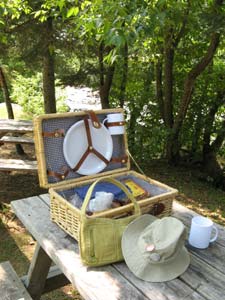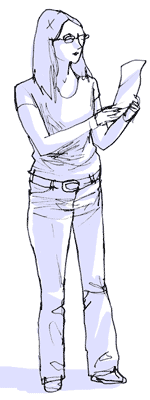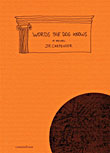an addendum to
WORDS THE DOG KNOWS compiled by Lisa Vinebaum,
also known as Auntie V.
After spending a week with Isaac the Wonder Dog Auntie V issued this statement:
sure isaac knows his name and a ton of ball-chasing + walking commands. big deal. m+d don't give isaac enough credit for the theoretical aspect of his vocabulary, which i was fortunate enough to coax out of him when i wasn't scaring him by screaming at the tv.
here then, is an updated list of some of the words isaac the wonder dog knows. (sadly he still has problems with his reference citation skills). thx isaac, for all your help with my dissertation this past week.
xo av.
ISAAC
Belief is the act of imagining. It is what the act of imagining is called when the object created is credited with more reality (and all that is entailed in greater “realness,” more power, more authority) than oneself. It is when the object created is in fact described as though it instead created you. It ceases to be the “offspring” of the human being and becomes the thing from which the human being himself sprung forth. It is in this act that ISAAC yields against all phenomenal assessment to Abraham, that Abraham yields to God, and the reader yields to the narrative.
— Elaine Scarry, The Body in Pain: The Making and Unmaking of the World
STAY
The Napoleonic failure to unite Europe under the French flag was a clear indication that conquest by a nation led either to the full awakening of the conquered people's national consciousness and to consequent rebellion against the conqueror, or to tyranny. And though tyranny, because it needs no consent, may successfully rule over foreign peoples, it can STAY in power only if it destroys first of all the national institutions of its own people.
— Hannah Arendt, The Origins of Totalitarianism.
NO
NO Beast is there without glimmer of infinity,
NO eye so vile nor abject that brushes not
Against lightning from on high, now tender, now fierce.
— Victor Hugo, La Légende des siècles
SIT
The mutual improvement school was to exploit still further this control of behaviour by the system of signals to which one had to react immediately. Even verbal orders were to function as elements of signalization: ‘Enter your benches. At the word enter, the children bring their right hands down on the table with a resounding thud and at the same time put one leg into the bench; at the words your benches they put the other leg in and SIT down opposite their slates... Take your slates.
— Michel Foucault, Discipline and Punish, The Birth of the Prison.
LIE DOWN
Keimai derives from Greek and means to LIE DOWN, to fall down and to put to sleep and is related to words meaning "home."
— Katherine Carl, on Monika Weiss: Drawing Cosmos
GO LIE DOWN
Do you want to GO LIE DOWN in the ice plants? Do you think they enjoy working for white people? Is that a fire in that trash can? What key, what key? Can it happen here? Is that the real color of her hair? What makes him prefer tangential
contingencies? Don’t you get your foreskin caught on things? Is it speech?
How far can you take it in? Do you prefer an automatic? When is form not
a distortion? Would you like to be queen for a day? Can you recall if you
have read this? Could you pick up the gun? Who broke that dish? Can you
prove that you exist?
— Ron Silliman, Sunset Debris
UP
Together with the build-UP of information superhighways we are facing a new phenomenon: loss of orientation. A fundamental loss of orientation complementing and concluding the societal liberalization and the deregulation of financial markets whose nefarious effects are well-known. A duplication of sensible reality, into reality and virtuality, is in the making. A stereo-reality of sorts threatens. A total loss of the bearings of the individual looms large. To exist, is to exist in situ, here and now, hic et nunc. This is precisely what is being threatened by cyberspace and instantaneous, globalized information flows.
— Paul Virilio, Speed and Information: Cyberspace Alarm!
DOWN
A fall-off in production, consumption, speculation and growth (but certainly not in corruption!): it is as though the global system were making a strategic fallback, carrying out a painful revision of its values — in defensive reaction, as it would seem, to the impact of terrorism, but responding, deep DOWN, to its secret injunctions: enforced regulation as a product of absolute disorder, but a regulation it imposes on itself — internalizing, as it were, its own defeat.
— Jean Baudrillard, The Spirit of Terrorism
COME
Let me turn to the issue of how those within a bounded sphere can COME to feel threatened by the presence of that which they deem to be "foreign". (The anxieties which drive this process are well captured in Juan Goytisolo's novel Landscapes after the Battle, whose "anti-hero" is disturbed by the "de-Europeanisation" of the French city in which he lives, "the emergence, in the perfectly ordered Cartesian perspectives of (Paris), of bits and pieces of Tlemcen and Dakar, Cairo and Karachi...”) The question is why the presence of alterity should so often be felt to be threatening. In this connection Azouz Begag writes that an "immigrant" is best understood as "a person designated as such by someone living in a particular place who sees the presence of the Other as a threat to their own sense of security within that territory". Similarly, Marc Auge puts it, "perhaps the reason why immigrants worry settled people so much is because they expose the relative nature of ‘certainties inscribed in the soil’.”
— David Morley, Home Territories – Media, Mobility and Identity 2
DROP
There are the Rhetoricians, who dissolve all meaning into form and make form into the sole law of literature, and the Terrorists, who refuse to bend to this law and instead pursue the opposite dream of a language that would be nothing but meaning, of a thought in whose flame the sign would be fully consumed, putting the writer face to face with the Absolute. The Terrorist is a misologist, and does not recognize in the DROP of water that remains on his fingertips the sea in which he thought he had immersed himself; the Rhetorician looks to the words and appears to distrust thought.
— Giorgio Agamben, The Man Without Content
HERE
For the thing as well as for the worker in his relation to time, socialisation or the becoming-social passes by way of this spectralisation. The “phantasmagoria” that Marx is working HERE to describe, the one that is going to open up the question of fetishism and the religious, is the very element of this social and spectral becoming: at the same time, by the same token. While pursuing his optical analogy, Marx concedes that, in the same way, of course, the luminous impression left by a thing on the optic nerve also presents itself as objective form before the eye and outside of it, not as an excitation of the optic nerve itself But there, in visual perception, there is really (wirklick), he says, a light that goes from one thing, the external object, to another, the eye: “physical relation between physical things.” But the commodity-form and the relation of value between products of labour in which it presents itself have nothing to do either with its “physical nature” or with the “thingly (material) relations” (dingliche Beziehungen) that arise from it. “It is nothing but the definite social relation between men themselves which assumes here, for them, the fantastic form [dies phantasmagorische Form] of a relation between things”
— Jacques Derrida, From Spectres of Marx, the state of the debt, the Work of Mourning, & the New International
GO
[. . . T]he mirror-image would seem to be the threshold of the visible world, if we GO by the mirror disposition that the imago of one's own body presents in hallucinations or dreams [. . .] or if we observe the role of the mirror apparatus in the appearances of the double, in which the psychical realities, however heterogeneous, are manifested.
— Jacques Lacan, The Mirror Stage as Formative of the Function of the I as Revealed in Psychoanalytic Experience
OUT
The problem with drag is that I offered it as an example of performativity, but it has been taken up as the paradigm for performativity. One ought always to be wary of one's examples. What's interesting is that this voluntarist interpretation, this desire for a kind of radical theatrical remaking of the body, is obviously out there in the public sphere. There's a desire for a fully phantasmatic transfiguration of the body. But no, I don't think that drag is a paradigm for the subversion of gender. I don't think that if we were all more dragged OUT gender life would become more expansive and less restrictive. There are restrictions in drag. In fact, I argued toward the end of the book that drag has its own melancholia.
— Extracts from Gender as Performance: An Interview with Judith Butler. Interview by Peter Osborne and Lynne Segal
. . . . .






